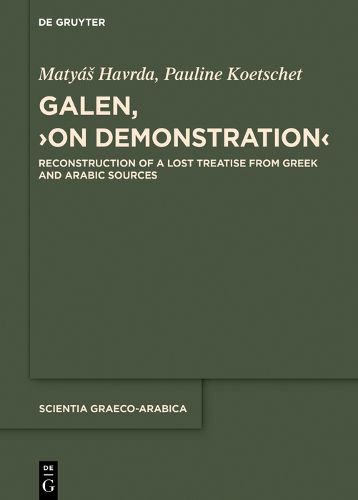Readings Newsletter
Become a Readings Member to make your shopping experience even easier.
Sign in or sign up for free!
You’re not far away from qualifying for FREE standard shipping within Australia
You’ve qualified for FREE standard shipping within Australia
The cart is loading…






Galen's On Demonstration (written c. 160 C.E.) was a tour de force of scientific methodology, loosely based on Aristotle's (and Theophrastus') Posterior Analytics and suited to the needs of a philosophically minded doctor. In its fifteen volumes, Galen outlined the theory of demonstration and the method of discovering premisses in natural-philosophical arguments, and rehearsed exemplary discussions to show how one should proceed when dealing with scientific problems. His polemics on issues in Aristotle's physics attracted the attention of Alexander of Aphrodisias and the Greek Neoplatonists and made a significant impact on Arabic philosophy. On Demonstration is lost, but parts of it can be reconstructed from Greek and Arabic sources. This book is a collection of all available testimonia, some published for the first time. They are accompanied by notes, translation, and a substantive introduction that deals with the sources, the history of scholarship, the purpose, structure and contents of the treatise, and its Arabic reception. The book will be useful for students and scholars of ancient and medieval medicine and philosophy, as well as those engaged in the study of the classical world, Graeco-Arabic studies or Islamic studies.
$9.00 standard shipping within Australia
FREE standard shipping within Australia for orders over $100.00
Express & International shipping calculated at checkout
Galen's On Demonstration (written c. 160 C.E.) was a tour de force of scientific methodology, loosely based on Aristotle's (and Theophrastus') Posterior Analytics and suited to the needs of a philosophically minded doctor. In its fifteen volumes, Galen outlined the theory of demonstration and the method of discovering premisses in natural-philosophical arguments, and rehearsed exemplary discussions to show how one should proceed when dealing with scientific problems. His polemics on issues in Aristotle's physics attracted the attention of Alexander of Aphrodisias and the Greek Neoplatonists and made a significant impact on Arabic philosophy. On Demonstration is lost, but parts of it can be reconstructed from Greek and Arabic sources. This book is a collection of all available testimonia, some published for the first time. They are accompanied by notes, translation, and a substantive introduction that deals with the sources, the history of scholarship, the purpose, structure and contents of the treatise, and its Arabic reception. The book will be useful for students and scholars of ancient and medieval medicine and philosophy, as well as those engaged in the study of the classical world, Graeco-Arabic studies or Islamic studies.